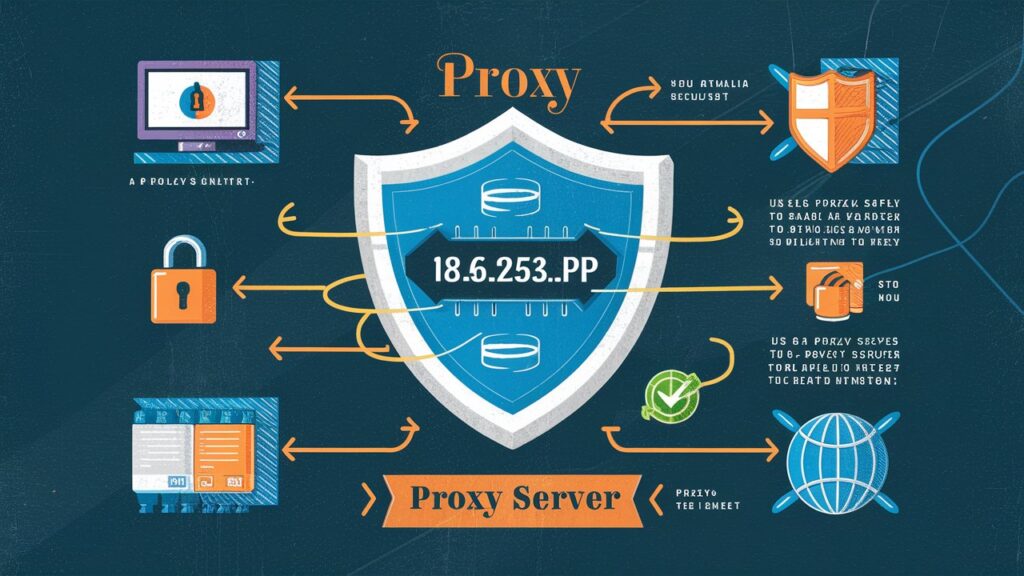The world of online privacy, anonymity, and data protection has expanded rapidly in the past decade, leading many to explore tools like proxies and VPNs. Among the terms that often appear in forums and proxy lists is “185.63.253.2pp”. At first glance, this may look like just another proxy IP address, but its recurring appearance in searches suggests it holds interest or relevance to users seeking anonymous access to the internet, enhanced scraping capabilities, or region-specific browsing. This article takes a deep dive into what 185.63.253.2pp is, how it’s used, what risks it might pose, and what alternatives exist if you’re considering using such a proxy for your daily internet activities.
What is 185.63.253.2pp?
The string “185.63.253.2pp” resembles an IP address combined with a suffix. In a traditional IPv4 format, an IP like 185.63.253.2 may represent a proxy server or gateway node, often located in a specific region. The “pp” portion at the end likely refers to a proxy provider identifier, internal tagging, or even a typo, though some proxy services use such suffixes to denote plans or protocols (e.g., private proxy, premium proxy). If listed on a proxy provider’s network or online tool, this address may allow users to reroute their internet connection through a third-party node, offering benefits like IP masking, geographic spoofing, and activity anonymization.
How Does 185.63.253.2pp Work?
Like most proxies, the supposed 185.63.253.2pp IP works by acting as a middle layer between your device and the websites you visit. When you access a site using a proxy, your actual IP address is hidden, and the site sees the proxy IP instead. This process helps in bypassing region restrictions, avoiding IP bans, and keeping online activity private. If 185.63.253.2pp is operational and part of a legitimate proxy pool, it will serve requests on your behalf, forwarding data between you and the destination server. These types of proxies are often used for web scraping, ad verification, SEO monitoring, and anonymous browsing.
Is 185.63.253.2pp a Safe Proxy IP?
The safety of any proxy IP depends on who controls the server, how it’s configured, and whether it supports secure protocols like HTTPS or SOCKS5. There is little verified public information about the exact ownership of 185.63.253.2pp, so caution is advised. Free proxies, in particular, are notorious for logging traffic, injecting malware, or exposing users to data leaks. If this IP is circulating on free proxy lists, it is likely shared among thousands of users, increasing the risk of it being blacklisted or already monitored. Safety-conscious users should avoid unverified or public proxies, especially for sensitive activity like logging into accounts or transmitting personal data.
How to Use 185.63.253.2pp for Browsing or Scraping
Assuming the 185.63.253.2pp proxy is functional and you’ve obtained access (through a provider or service), you can set it up in most web browsers or scraping tools like Python’s Requests library, Puppeteer, or Selenium. When using it:
-
Ensure the proxy supports the protocol you need (HTTP, HTTPS, or SOCKS).
-
Test the proxy for speed and DNS leaks.
-
Rotate proxies when scraping to avoid detection or rate limits.
-
Never use a public proxy for account logins or financial transactions.
Many scraping professionals use proxies like 185.63.253.2pp with rotating proxy pools to extract large datasets from websites without triggering security blocks.
Risks of Using Proxy IPs Like 185.63.253.2pp
While proxies offer anonymity, they come with several risks. Free or public proxies can compromise user privacy by capturing transmitted data, especially when HTTPS is not enforced. Others may be honeypots set up by malicious actors or even government agencies to trap illegal activity. If 185.63.253.2pp is flagged as malicious, it could already be blocked by search engines, banks, or social media platforms. Users may also unknowingly use the same IP as spammers or hackers, leading to IP blacklisting and denial of service from websites.
Best Alternatives to 185.63.253.2pp in 2025
If you’re concerned about security, reliability, or legality, it’s best to invest in reputable proxy services. Leading providers in 2025 include:
-
Bright Data (formerly Luminati) – for large-scale scraping
-
Smartproxy – offers residential and datacenter IPs
-
Oxylabs – high-quality proxy pool with analytics tools
-
Hide.me or NordVPN – for secure browsing proxies
These services offer transparent IP sourcing, legal compliance, and encryption. Rather than relying on uncertain addresses like 185.63.253.2pp, using these services reduces risk and improves performance.
Conclusion
The term 185.63.253.2pp may represent a proxy IP, possibly used for anonymous browsing, scraping, or geo-location bypassing. However, the lack of public verification and standard naming raises questions about its safety and legitimacy. While proxy IPs are powerful tools for privacy and automation, choosing the right one is crucial. Relying on questionable or free proxies can lead to data theft, bans, or poor performance. It’s always wiser to opt for trusted proxy providers, use encryption, and stay informed about the risks associated with third-party IP usage.
❓ FAQ – 185.63.253.2pp and Proxy Usage
Q1: Is 185.63.253.2pp a real IP address?
A: It resembles an IPv4 address, but the “2pp” suffix makes it non-standard. It may be a custom label or internal proxy notation.
Q2: Can I use 185.63.253.2pp for anonymous browsing?
A: Possibly, if it functions as a proxy IP. However, using unknown proxies can be risky without knowing the source.
Q3: Is it legal to use proxy IPs like 185.63.253.2pp?
A: Yes, using proxies is legal in most countries for lawful purposes. However, using them to access restricted or copyrighted content may violate terms of service.
Q4: What’s better — VPN or proxy like 185.63.253.2pp?
A: VPNs offer end-to-end encryption and full traffic masking. Proxies are lighter and better for tasks like scraping but less secure.
Q5: How do I test if 185.63.253.2pp is working?
A: Use tools like Proxy Checker, curl, or command-line tests to verify response time, IP exposure, and protocol support.

